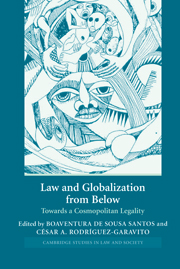Book contents
- Frontmatter
- Contents
- Notes on the contributors
- 1 Law, politics, and the subaltern in counter-hegemonic globalization
- PART ONE LAW AND THE CONSTRUCTION OF A GLOBAL ECONOMY OF SOLIDARITY
- PART TWO TRANSNATIONAL SOCIAL MOVEMENTS AND THE RECONSTRUCTION OF HUMAN RIGHTS
- PART THREE LAW AND PARTICIPATORY DEMOCRACY: BETWEEN THE LOCAL AND THE GLOBAL
- 12 Political and legal struggles over resources and democracy: experiences with gender budgeting in Tanzania
- 13 Two democracies, two legalities: participatory budgeting in Porto Alegre, Brazil
- 14 Life, life world, and life chances: vulnerability and survival in Indian constitutional law
- 15 Bottom-up environmental law and democracy in the risk society: Portuguese experiences in the European context
- Index
- References
12 - Political and legal struggles over resources and democracy: experiences with gender budgeting in Tanzania
Published online by Cambridge University Press: 07 July 2009
- Frontmatter
- Contents
- Notes on the contributors
- 1 Law, politics, and the subaltern in counter-hegemonic globalization
- PART ONE LAW AND THE CONSTRUCTION OF A GLOBAL ECONOMY OF SOLIDARITY
- PART TWO TRANSNATIONAL SOCIAL MOVEMENTS AND THE RECONSTRUCTION OF HUMAN RIGHTS
- PART THREE LAW AND PARTICIPATORY DEMOCRACY: BETWEEN THE LOCAL AND THE GLOBAL
- 12 Political and legal struggles over resources and democracy: experiences with gender budgeting in Tanzania
- 13 Two democracies, two legalities: participatory budgeting in Porto Alegre, Brazil
- 14 Life, life world, and life chances: vulnerability and survival in Indian constitutional law
- 15 Bottom-up environmental law and democracy in the risk society: Portuguese experiences in the European context
- Index
- References
Summary
INTRODUCTION
During the struggles for independence, political and social activists such as Mwalimu Julius Nyerere and Bibi Titi Mohamed brought women's and poor people's experiences into the public debate, albeit within the limitations of their times. Now, over forty years later, many women and men in Tanzania are concerned with how gender, race, ethnic, class, and imperial differences affect and are affected by policy developments and economic changes at the local, national, and global levels. Critical feminist activists are actively struggling to analyze and influence the decisions that affect their lives at all levels.
This chapter examines feminist struggles in Tanzania over issues of ownership and control of resources which have been led by the Tanzania Gender Networking Programme (TGNP) and the Feminist Activist coalition (FemAct), as they relate to corporate-led globalization, equity, social justice, people's participation, and social transformation. The GB Initiative (GBI) is highlighted in order to illustrate efforts by activist organizations to challenge and change the structures of power which create policy and invent law. The analysis shares the experience of feminist efforts in linking policy engagement and legal processes to social transformation, participatory democracy, and people-owned development processes. Of particular concern has been the systematic exclusion of the majority of people from direct participation in the formulation of policy and law, and their implementation and monitoring.
- Type
- Chapter
- Information
- Law and Globalization from BelowTowards a Cosmopolitan Legality, pp. 283 - 309Publisher: Cambridge University PressPrint publication year: 2005
References
- 3
- Cited by



